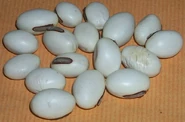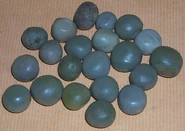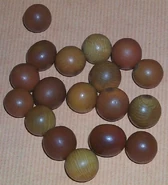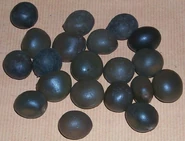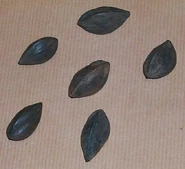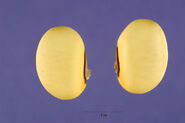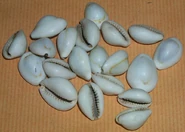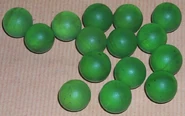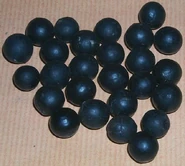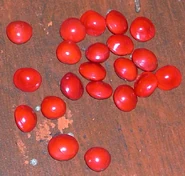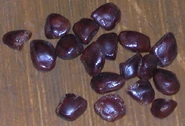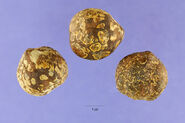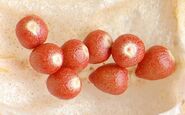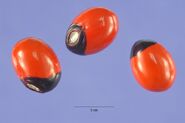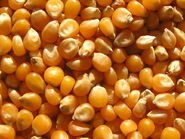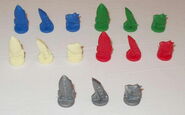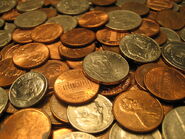Mr Mancala (talk | contribs) (→Images) |
Mr Mancala (talk | contribs) |
||
| Line 49: | Line 49: | ||
| Bean (''Fabaceae ssp.'') || [[Bohnenspiel]] (Germany, Tsaristic Russia); [[Cups]] <br />(USA - modern); [[Oware]] (Senegal) |
| Bean (''Fabaceae ssp.'') || [[Bohnenspiel]] (Germany, Tsaristic Russia); [[Cups]] <br />(USA - modern); [[Oware]] (Senegal) |
||
|- |
|- |
||
| − | | |
+ | | Calabash Tree (''Crescentia cujete'') || [[Hoyito]] (Dominican Republic) |
|- |
|- |
||
| Sapodilla (''Manilkara achras'') || [[Dakon]] (Indonesia); [[Vamana Guntalu]] (India) |
| Sapodilla (''Manilkara achras'') || [[Dakon]] (Indonesia); [[Vamana Guntalu]] (India) |
||
Revision as of 12:56, 19 February 2010
Seeds → Portuguese.
The counters employed in mancala games are usually called seeds even if they are not really plant seeds, but cowries, pebbles or dung balls, while in many modern games glass stones or plastic pieces are used.
The symbolic meaning depends on the societal background of the game. In agricultural societies the counters usually stand for the seeds used to till a field. A certain amount of seeds which is captured, e.g. two or three in Oware or two, four and six in the Bohnenspiel, represents a ripe fruit that is harvested. In societies which are based on fishing the seeds can mean fish. In pastoral societies the counters are considered to be cattle. In general, the symbolic meaning is often associated with fertility.
Sometimes the counters of modern mancala games also have a special meaning. In Banan-Cala they are fruits, in Space Walk space ships, in Glass Bead Game precious gems.
No Seed is a political thriller directed by Howard and Mitzi Allen of Antigua in 2002 which tells a story of power, superstition and deception. The film is craftily woven to parallel a Warri game. Its name is an allusion to the well-known Antiguan Warri proverb:
"When you play Warri with God, you get no seed".
Typical Counters
| Plant (Latin name of the species) | Games & Country |
| Olinda Creeper (Abrus precatorius) called kundumani in Tamil |
Daramutu (Sri Lanka), Kotu-baendum (Sri Lanka); Walak-pussa (Sri Lanka); Puhulmutu (Sri Lanka) |
| Red Bead Tree (Adenanthera pavonina) | Pallankuzhi (India) |
| Candlenut (Aleurites moluccana) called kemiri in India |
Vamana Guntalu (India) |
| Arnotto Tree (Bixa orellana) | Cenne (India) |
| Gray Nickernut (Caesalpinia bonduc) | Um ed-Dyar (Mauretania); Waurie (Grand Cayman); Bao (Tanzania); En Gehé (Tanzania); Kauri (Germany); Kiothi (Kenya); Oware (Western Africa); Tchouba (Mozambique) |
| Msolo (Caesalpinia cristata) | Bao (Tanzania) |
| Brown Nickernut (Caesalpinia major) | Warri (Antigua & Barbuda); Waurie (Grand Cayman) |
| Mubuthi (Caesalpinia volkensii) | Giuthi (Kenya) |
| Menga (Canarium schweinfurtii) | Kisolo (Congo) |
| Jack Bean (Canavalia ensiformis) | Um ed-Dyar (Mauretania) |
| Indian Canna (Canna indica) | Songo Ewondo (Cameroon) |
| Oil Palm (Elaeis guineensis) | Songo Ewondo (Cameroon) |
| Kaffir Coral Tree (Erythrina caffra) | Cenne (India) |
| Bean (Fabaceae ssp.) | Bohnenspiel (Germany, Tsaristic Russia); Cups (USA - modern); Oware (Senegal) |
| Calabash Tree (Crescentia cujete) | Hoyito (Dominican Republic) |
| Sapodilla (Manilkara achras) | Dakon (Indonesia); Vamana Guntalu (India) |
| Luiki (Mesoneurum welwitschianum) | Omweso (Uganda) |
| Wild Banana (Musa acuminata ssp.); seeds are called empiki |
Omweso (Uganda) |
| Ngola Tree (Pictantus makombo) | Embeli (Congo); Imbelece (Congo); Kisolo (Congo) |
| African Nut Tree (Ricinodendron heudelotii) | Okwe (Nigeria) |
| Marula Tree (Scelocarya birrea) | Hus (Namibia); Tchouba (Mozambique) |
| Tamarind (Tamarindus indica) | Ali Guli Mane (Malaysia); Kuzhi Palaka (India); Pallanguzhi Āṭam (India); Vamana Guntalu (India) |
| Maize (Zea mays) | Vamana Guntalu (India) |
| Animal (Latin name of the species) | Games & Country |
| Goat (Capra aegagrus hircus) | Hus (Namibia); Unee Tugaluulach (Mongolia) |
| Domestic Sheep (Ovies aries) | Hus (Namibia); Tap-urdy (Turkmenistan); Toguz Kumalak (Kazakhstan, old times); Um ed-Dyar (Mauretania); Unee Tugaluulach (Mongolia) |
| Dromedary (Camelus dromedarius) | Layli Goobalay (Somalia) |
| Natural Materials | Games & Country |
| "Black Pearls" (?) | Songo Ewondo (Cameroon) |
| Cowries (Cypraea ssp.) | Bao (Tanzania); Cenne (India); Congkak (Malaysia); Kauri (Germany); Pallankuzhi (India); Sungka (Philippines); Ali Guli Mane (India) |
| Inorganic & Artificial Materials | Games & Country |
| Pebbles | Adji-boto (Suriname); Aw-li On-nam Ot-tjin (Malaysia); Bao la Kimasai (Tanzania); Bulto (Ethiopia); En Gehé (Tanzania); Giuthi (Kenya); Hawalis (Oman); Hus (Namibia); Katro (Madagascar); Kiela (Angola); Layli Goobalay (Somalia); Tsoro (Zimbabwe); Um ed-Dyar (Mauretania); Vai Lung Thlan (India) |
| Gems | Vamana Guntalu (India) |
| Marbles | Chonka (Indonesia (Borneo)) |
| Glass Beads | Glass Bead Game (Netherlands - modern); Oware (industrial) |
| Glass Stones | Kalah (USA - modern); Warra (USA) |
| Sanded Ceramic Fragments | Warra (USA) |
| Wooden Pieces | Banan-Cala (USA - modern) |
| Cards (Paper) | Cow Poke (USA - modern); Octagons (England - modern); Rondell (Germany - modern); Widdershins (England -modern) |
| Golden Counters | Oware (Ghana - Ashanti kings) |
| Coins | Coin Duel (USA - modern) |
| Plastic Beads | Toguz Kumalak (Kazakhstan - today); Oware (industrial) |
| Plastic Pieces | Space Walk (Germany - modern) |
See also
Images
Copyright
© Wikimanqala.
By: Ralf Gering.
Under the CC by-sa 2.5.
